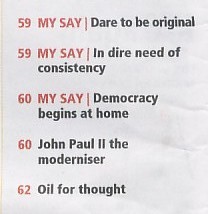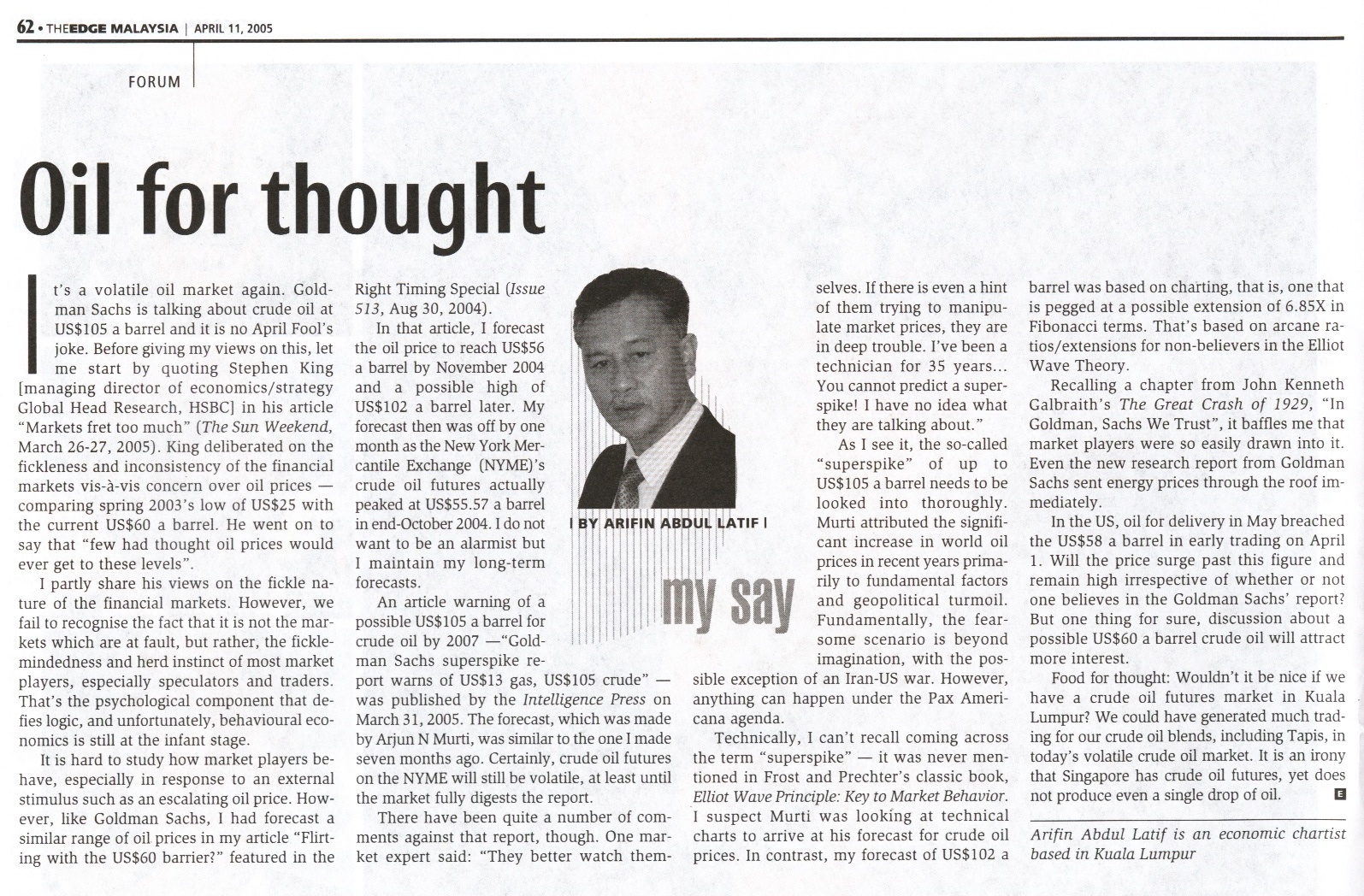It's a volatile oil market again. Goldman
Sachs is talking about crude oil at US$105 a
barrel and it is no April Fool's joke. Before
giving my views on this, let me start by quoting
Stephen King [managing director of
economics/strategy Global Head Research, HSBC] in
his article "Markets fret too much" (The
Sun Weekend, March 26-27, 2005). King deliberated
on the fickleness and inconsistency of the
financial markets vis-a-vis concern over oil
prices -- comparing spring 2003's low of US$25
with the current US$60 a barrel. He went on to say
that "few had thought oil prices would ever
get to these levels".
I partly share his
views on the fickle nature of the financial
markets. However, we fail to recognise the fact
that it is not the markets which are at fault, but
rather, the fickle-mindedness and herd instinct of
most market players, especially speculators and
traders. That's the psychological component that
defies logic, and unfortunately, behavioural
economics is still at the infant stage.
It is
hard to study how market players behave,
especially in response to an external stimulus
such as an escalating oil price. However, like
Goldman Sachs, I had forecast a similar range of
oil prices in my article "Flirting with the
US$60 barrier?" featured in the Right Timing
Special (Issue 513, Aug 30, 2004).
In that article, I forecast the oil price to
reach US$56 a barrel by November 2004 and a
possible high of US$102 a barrel later. My
forecast then was off by one month as the New York
Mercantile Exchange (NYME)'s crude oil futures
actually peaked at US$55.57 a barrel in
end-October 2004. I do not want to be an alarmist
but I maintain my long-term forecasts.
An
article warning of a possible US$105 a barrel for
crude oil by 2007 -- "Goldman Sachs
superspike report warns of US$13 gas, US$105
crude" -- was published by the Intelligence
Press on March 31, 2005. The forecast, which was
made by Arjun N Murti, was similar to the one I
made seven months ago. Certainly, crude oil
futures on the NYME will still be volatile, at
least until the market fully digests the report.
There
have been quite a number of comments against that
report, though. One market expert said: "They
better watch themselves. If there is even a hint
of them trying to manipulate market prices, they
are in deep trouble. I've been a technician for 35
years... You cannot predict a super-spike! I have
no idea what they are talking about."
As
I see it, the so-called "superspike" of
up to US$105 a barrel needs to be looked into
thoroughly. Murti attributed the significant
increase in world oil prices in recent years
primarily to fundamental factors and geopolitical
turmoil. Fundamentally, the fearsome scenario is
beyond imagination, with the possible exception of
an Iran-US war. However, anything can happen under
the Pax Americana agenda.
Technically, I can't
recall coming across the term "superspike"
-- it was never mentioned in Frost and Prechter's
classic book, Elliot Wave Principle: Key to Market
Behavior. I suspect Murti was looking at technical
charts to arrive at his forecast for crude oil
prices. In contrast, my forecast of US$102 a
barrel was based on charting, that is, one that is
pegged at a possible extension of 6.85X in
Fibonacci terms. That's based on arcane
ratios/extensions for non-believers in the Elliot
Wave Theory.
Recalling a chapter from John Kenneth
Galbraith's The Great Crash of 1929, "In
Goldman, Sachs We Trust", it baffles me that
market players were so easily drawn into it. Even
the new research report from Goldman Sachs sent
energy prices through the roof immediately.
In
the US, oil for delivery in May breached the US$58
a barrel in early trading on April 1. Will the
price surge past this figure and remain high
irrespective of whether or not one believes in the
Goldman Sachs' report? But one thing for sure,
discussion about a possible US$60 a barrel crude
oil will attract more interest.
Food for
thought: Wouldn't it be nice if we have a crude
oil futures market in Kuala Lumpur? We could have
generated much trading for our crude oil blends,
including Tapis, in today's volatile crude oil
market. It is an irony that Singapore has crude
oil futures, yet does not produce even a single
drop of oil.



